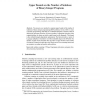Free Online Productivity Tools
i2Speak
i2Symbol
i2OCR
iTex2Img
iWeb2Print
iWeb2Shot
i2Type
iPdf2Split
iPdf2Merge
i2Bopomofo
i2Arabic
i2Style
i2Image
i2PDF
iLatex2Rtf
Sci2ools
117
click to vote
CPAIOR
2010
Springer
2010
Springer
Upper Bounds on the Number of Solutions of Binary Integer Programs
We present a new method to compute upper bounds of the number of solutions of binary integer programming (BIP) problems. Given a BIP, we create a dynamic programming (DP) table for a redundant knapsack constraint which is obtained by surrogate relaxation. We then consider a Lagrangian relaxation of the original problem to obtain an initial weight bound on the knapsack. This bound is then refined through subgradient optimization. The latter provides a variety of Lagrange multipliers which allow us to filter infeasible edges in the DP table. The number of paths in the final table then provides an upper bound on the number of solutions. Numerical results show the effectiveness of our counting framework on automatic recording and market split problems.
Binary Integer Programming | CPAIOR 2010 | Operations Research | Redundant Knapsack Constraint | Upper Bound |
Related Content
| Added | 19 Jul 2010 |
| Updated | 19 Jul 2010 |
| Type | Conference |
| Year | 2010 |
| Where | CPAIOR |
| Authors | Siddhartha Jain, Serdar Kadioglu, Meinolf Sellmann |
Comments (0)

